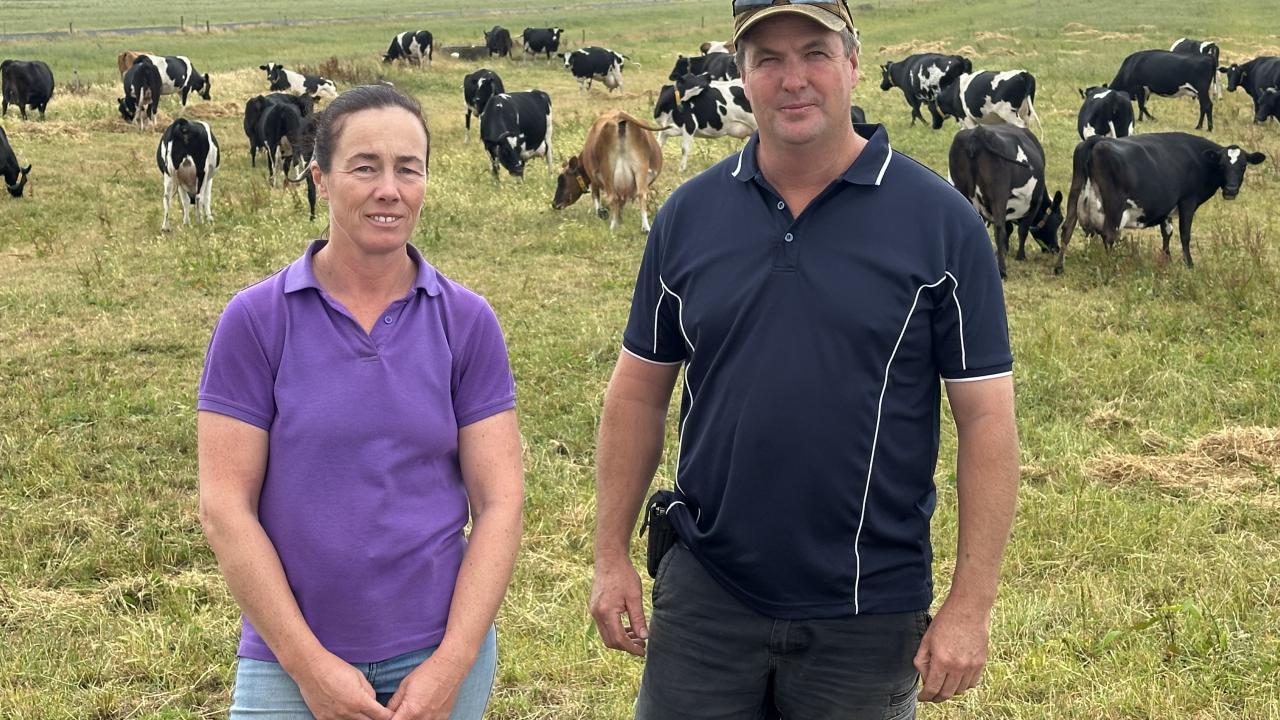DairyTas Chairman Luke moves with the times

AFTER building a successful career, new DairyTas chairman Luke McNab has taken the opportunity to give something back to the industry he is so passionate about.
Mr McNab runs a large dairy and mixed farming operation at Rocky Cape with his wife, Katrina.
After starting their working lives off-farm as a mechanical engineer and teacher, the couple saved up and bought their first 105ha property in their early 20s.
“We worked our day jobs and did that on our time off for a while,” Mr McNab said.
“We didn’t really see it as a job, because when you’re working elsewhere things like fencing and moving cows is fun.”
After selling that property and purchasing more land they eventually bought the farm being run by Mr McNab’s parents about eight years ago.
They milk 700 cows on the 330ha property at Rocky Cape.
About 300ha of the property is irrigated, Mr McNab said while the property tends to be a bit drier in summer their position next to the coast means soil temperatures remain fairly warm year round ensuring they get reasonable pasture growth even through winter.
After struggling to find labour, the couple made the decision to adopt some new technology in the form of robotic milking units.
“It was initiated with labour and our old dairy was getting a bit dated,” Mr McNab said.
“We were thinking about replacing it and we were thinking about robots or a rotary and the numbers stacked up for the robots.”
The couple installed 16 robots about 10 years ago when the technology was still relatively new.
Mr McNab said making the change to a robotics had presented some challenges initially.
“The cows adjust to the system really well if you have a system for them to follow,” he said.
“Once you know what you’re doing with robotics you could go and set another farm up and it would be quite successful.
“When you don’t know what you’re doing though, there’s not really a manual to follow.”
While there is a lot more information available now about robotic milking systems, Mr McNab said that was not always the case.
“Some of the earlier pioneers really did pioneer, because they were made for a barn system, so they had to learn a lot about how to make them work for grazing,” he said.
Milk from the farm is supplied to Cadbury. After using a split calving system, the McNabs have now changed to a summer calving pattern.
That means it is a busy time on the farm at the moment, with calving getting into full swing.
Mr McNab said calving at this time of the year when the conditions are drier and warmer has some significant benefits.
After starting out with a cross-bred herd, over the past few years the McNabs have been introducing more Holstein genetics.
They were also breeding heifers suitable for the Chinese export market.
To do this, Mr McNab said they use sexed semen for the first six weeks of joining then put Angus bulls out for a further six weeks.
Cross-bred calves in the operation are kept and reared for dairy beef. After gradually expanding their operation, the couple now have about 810ha over four properties.
As well as the dairy farm, the couple also run a beef finishing operation with about 1000 cattle and grow up to 45ha of potatoes each year.
Mr McNab joined the DairyTas board about two years ago.
“At first it was just a means of giving back to the industry that has done well by us, so I thought I would apply and was successful in getting on,” he said.
Mr McNab said being involved with the organisation had given him a different perspective.
“Originally when I went on the board, I thought I was going to represent the Tasmanian levy payer when in fact, you’re representing the Tasmanian dairy industry,” he said.
“A lot of people utilising DairyTas are not direct levy payers, but they’re involved in the industry which comes from a farm which has cows and pays levies.
“It’s good though, I’m learning, and we have a really good board now with a diverse range of people.”
Mr McNab said one area they are focusing on is getting more people involved with the regular DairyTas events and discussion groups.
He said the shift across the industry away from traditional family ownership to more corporate farms, means there is a need for more networking and social activities.
“We would like to see people who haven’t been involved to get involved,” he said.
“We’re looking at why those people aren’t involved and how we can maybe tweak things to get them involved.”
Mr McNab said the organisation’s young dairy network and women’s discussion groups were very successful and there may be a need for similar groups for men.
“We might look at introducing something like that so everyone feels like they’re part of a group or can be if they want to get involved,” he said.
Mr McNab said he would encourage anyone considering getting involved with the DairyTas board to give it a go.
“It takes a bit of time but it’s not too bad and you can be as involved or as quiet as you like,” he said.
“I think the industry wants a good strong board and they want to see people on there they know and sort of respect.
“Farmers like to see where their levies are going. I’d like all the farmers to see DairyTas as their own and to be involved if they want to.”

Add new comment